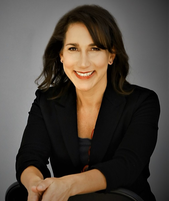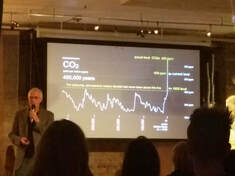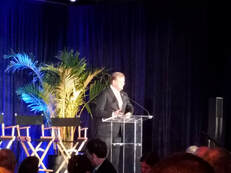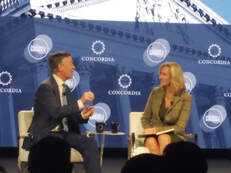|
These days most people I surround myself with consider themselves Change Agents. We're in such a defining moment in the world, where serious crisis on climate, geo-political risk, reputation, social culture, human rights and all the everything in between is up for defining, aligning and totally re-envisioning. The future is one of purpose, values, sustainability, conscious leadership and new ways of approaching old problems. We are in the 4th Industrial Revolution, the time of the 6th Extinction, the Time of the Black Jaguar,... whatever you call it... we are in a time of change. We need conscious leaders with respect for life and commitment to a life generating economy willing to hold space for these rapid changes. If you consider yourself a Change Agent, then maybe the following 5 tools can be of use for you. 1. Master Non-Linear Thinking 2. Challenge Assumptions 3. Courage to Go Against the Status Quo 4. Take Risks 5. Inspire People to Follow in Respect 1. MASTER NON-LINEAR THINKING Most people in society today, in our companies, institutions, governing bodies and professional services industries see, listen and understand through linear perception. Conscious leaders connect more dots, see how things are related, can follow a thread of futuristic possibility because they're not only tapped into a linear way of 'seeing' but also the non-linear. Non-linear thinking is less obvious. You have to see around corners and trust in your own discernment. You have to position your non-linear thinking in a way that communicates it linearly so people grasp your vision and can ground it through their own lens. Generally we need linear causal arguments to prove everything. The business case comes from the head not the heart and our perception is skewed toward assumptions that have been made by our collective about how everything works. Often our assumptions are based on marketing and positioning by powerful engines that have directed our economy and thinking in a certain direction for centuries. And this forms our worldview. Change Agents have a holistic perspective, see the bigger picture, connect the dots on causation that may in fact, not appear linear but instead are born from a state of perceiving the not so obvious, non-linear. To solve many of our global crisis' today in the context of business and economic growth, we must be willing to leap into the unknown and seek for new solutions. It's often a non-linear way of thinking about systems change that will help us find solutions to problems we don't even know we have yet. What if 'when' we evolve to another level of consciousness we will finally see this and it will be too late? Change Agents are often futurists. In other words they see possibilities the collective doesn't yet see. Change Agents use their non-linear perception to stay one leg ahead of the game and trust their abilities to know what is true while taking a stand for it no matter what. The good news is, non-linear thinking can be taught, honed, and unlocked in all of us. 2. CHALLENGE ASSUMPTIONS Change Agents challenge assumptions, disrupt old ways of doing things when they see a better way that improves the lot for all and are committed to unwrapping the gifts in their own biases. Change Agents recognize the assumptions, beliefs and biased notions upon which our society and economy were built and are quick to challenge these assumptions without threatening others who don't see it. In fact Change Agents are often seeking out their own biases because they know any slant in vantage point is a disadvantage without viewing the situation from all vantage points. The competitive edge comes when we can see a situation from various perspectives and take responsibility for our own biases. Change Agents will always gently call out a bias when they see one. A skilled Agent can deliver the message gracefully and invite the 'other' to feel safe in exploring the possibility of truth in said bias. In other words humility is a great gift of the Change Agent, as well as conscious communications. Change agents deploy a certain choice of words and language that eases others into thinking and accepting the challenge to question their own assumptions about the problems we are dealing with and the opportunities that could exist that others aren't seeing. Change Agents in a certain industry or organization enjoy collaborating with external Change Agents. With deep commitment to disrupting the status quo, Change Agents are humble enough to realize an external perspective may be needed to probe deeply enough to disrupt even their own assumptions. I personally enjoy when mine are challenged! When we expand outside of our assumptions, we evolve one notch higher on the consciousness spectrum. 3. GO AGAINST THE STATUS QUO The status quo is laced with biases, be them racial, gender, environmental, political, or categorically something else. I can't tell you how many people would call me a hippy because I was an environmental activist. What is that about? Very far from true, yet this is a stereotype and the connotation lends itself to a bias. The notion that ESG investing or Impact Investing means a lower return is a bias. Stereotypes and biases are unfortunately what adorn the status quo. Biases are gifts wrapped with opportunity when we are willing to see, really see the situation with a non-linear lens. It creates an opening for healing and a safe space to own personal responsibility. A bias is a set of beliefs about a person, or type of person, an issue or situation that is reflexive and not often anchored in personal experience, but a belief system that was passed on and is not necessarily based in reality. Biases are potentially toxic, harmful and have detrimental impacts on all of us, when we are not collectively open to challenging them. When we challenge them, we accept change. Change is scary for many people that's why we hang on to things that no longer serve us. Hence, the Change Agent is tasked with guiding individuals and the collective through a transformation and must be optimistic, honest, and courageous in a way that engages others through conscious influence. Through conscious leadership, a Change Agent models the transformational nature of respect. Respect on all levels is often a shock to the status quo. Sometimes a Change Agent has to be okay with recognizing that the world may not be ready for what they have to say. So we plant seeds, hold space and sit back and watch as others start to say what you've been saying for years, as if they had an epiphany. Divine timing is just part of the process. Change Agents must be persistent and agile as well as experts at surrendering -to the non-linear way things sometimes unfold. What happens when we take responsibility for our beliefs, biases and complicity in the status quo? We expand our consciousness and ability to perceive other possibilities, solutions and opportunities to advance transformation on many otherwise seemingly impossible issues to solve. What this expansive scope gives us, is an empowered, creative, compassionate understanding of why others see things the way they do. To challenge the status quo without barking our beliefs down someone's throat, we need to listen, hear, and perceive where the 'other' is coming from and be willing to stay true to what we believe even if it goes against the status quo. 4. RISKS BEAT THE PAIN OF FAILURE As a Change Agent you likely have an area or cause that speaks most powerfully to you. You're also good at connecting the dots and seeing how the issue at hand impacts a whole host of other issues. When faced with speaking up, putting yourself out there, telling your truth, going against the grain, taking a leap, launching bigger, getting the help you need to at least take the leap, you'll risk money, time, energy and reputation because you know you can't go wrong if you're truly acting from your heart- (I recommend always checking in with the mind!) And you know the change you wish to see has to happen no matter what. You'll risk the pain of failure, the fall out from speaking truth to power, and the uncertain path that lies ahead when you follow your mission because you know it's not really failure, only one step on the path toward the success and transformation you are a stand for. 5. INSPIRE OTHERS TO FOLLOW Even if you personally don't have the capacity, resources or mindset to scale the change, you as a Change Agent wish to see, you have a role to play. By speaking your truth, causing others to think and challenge assumptions in a conscious and non threatening or judgmental way, you may inspire another to lead a movement that changes the world. Change Agents are the action takers as well as the catalysts behind the scenes who set the stage, strategy and agenda, who write, speak, teach, and hold space for other possibilities. Some Change Agents are the ideationists, (idea people), others are the activists (action takers), others are the silent healers that prime the landscape for the massive paradigm shift we are actually already experiencing. Don't believe the marketing hype of what a 'Change Agent' looks like. Many of us are Guerrilla Change Agents, undercover on assignment and no one would even know. Are you ready to make some change in your organization, industry or the world? Start with your personal life, your mindset and what inside of you needs to shift or align for you to have your next level of transformational impact. Reach out for a complementary laser insights brief if you would like a sounding board or support in unfolding your next level of Change.... s@stephanietrager.com Intentionally, Stephanie  Stephanie Trager, Intentional Paradigms www.intentionalparadigms.com Executive Coach, Strategic Advisor, Medicine Woman, Attorney, Keynote Speaker, Website , LinkedIn, Facebook, Twitter, Instagram To learn how we can co-create your next level of success -sustainably- or to learn about our First Annual Dream Change Mastermind Email me at s@stephanietrager.com Visit www.dreamchange.org
0 Comments
Leave a Reply. |
Archives
August 2020
|






 RSS Feed
RSS Feed

